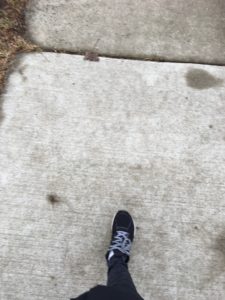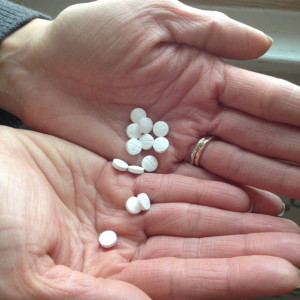I’m working with my happy light just off to my right. I will let it do it’s thing – bombarding my brain via my eyes with fake sunlight minus the bad UV rays. It’s one of several tricks up the sleeves of those of us with Seasonal Affective Disorder (SAD) where the lack of natural sunlight can impair and impact our mood and mental health. This year has felt like a triple whammy – clinical depression, a global pandemic and SAD. Oh, I forgot to add the unprecedented events including and leading up to an attempted coup so that makes it a quadruple whammy.
Mental health talk is slowly losing its sting, but there’s still a sting. How do I know? Because whenever I mention it anywhere publicly I get public comments AND private ones from Dear Readers who don’t feel comfortable sharing in a public comment about their own depression, whose loved ones and community still do not understand that we all should care about our mental health, whose churches will encourage them with toxic positivity to pray it away. Just because you talk about mental health doesn’t mean you have a problem, but if you can’t talk about mental health you won’t have any tools to help bring yourself or loved ones back to health.
So let’s talk about mental health
I want to be clear. I have no thoughts of self-harm. We need to make statements like that normal, normal and healthy for people to say them and for questions about self-harm to be normal and healthy.
For those of us in places will actual seasons, the December, January, February and sometimes March and parts of April are not all a Winter Wonderland (I’m looking at you my Dear Readers from warm, sunny places that think shoveling snow would be fun). They are cloudy, gloomy, cold and isolating. Because of the COVID19 pandemic isolation has taken on new levels. Our family has not entertained inside our home since February 2020. We haven’t had friends or family gathered around our kitchen table, a table that has uncomfortably fit 18 people. We haven’t hosted high school pre- or post-dance parties like we did in the fall of 2019 when 30 high schoolers feasted on carbs and left a trail of glitter, sequins, and corsages (parents we need to talk about how much money we spend on flowers for these kids) and socks from when the guys in the group slept over in the basement.
So the happy light brings fake sun to help regulate our brains and sometimes we add Vitamin D supplements for added measure. For some of us, and definitely for me, medication (10 mg of Lexapro daily) keeps the other things going, and when I’m on top of it I do the other things – exercise, stay hydrated, limit screen time (ok, I’m not so good at this).
But sometimes doing all the right things isn’t enough. It helps us keep from sinking further, but it isn’t enough because we can’t checklist our way out of depression.
It can feel a little like falling – that split second you experience the sensation of losing balance. But that split second is split into days and weeks and months of that sensation of losing your equilibrium, of losing a sense of balance and direction, of losing trust in yourself to make the right decision that could possibly break your fall but also break a bone or two in the landing. It’s feeling like you’re moving in slow motion as you are trying to right yourself and no single movement feels like it’s going to keep you from the inevitable crash because you can’t feel your body completely, you can’t see your surroundings completely, you can’t always understand your body or your surroundings at all.
Sometimes you…
- Start missing deadlines or forget things or flake out, and then you feel horrible about yourself and want to crawl into a hole. So then you try to make up for that but that exhausts you or you stop trying. You can’t sleep or sleep too much and that makes you feel horrible and that horrible feeling can lead to anxiety or a deeper depression. It’s a vicious cycle.
- Hit a wall. Last week I put on make up, dressed up, chilled a mini bottle of champagne, and celebrated the inauguration of our first but not last woman of color vice president – Madame Vice President Kamala Devi Harris and her running mate Mister President Joseph Robinette Biden Jr. But for all the emotions and thoughts running through my mind and body I could not for the life of me cry. For me, that is a sign that my mental health is not tracking with my body and my emotions. And even my emotions felt numb, which I also fully recognize is part of healing from the grief and trauma of but not limited to the past four years.
- Have to name it. I was telling myself it was a passing day of clouds, but the passing days have been weeks and months. I’ve been having trouble sleeping. Trouble falling asleep and then once I am finally asleep wanting to stay in bed for as long as I can get away with. The things that usually help (exercise usually perks me up) don’t help after days of trying and then the trying gets exhausting. I put on some extra weight during the months of sheltering in place, and that has made being comfortable in my own skin a challenge. It becomes a vicious cycle. I wanted it to just be in my head but that’s the thing with depression. IT IS IN MY HEAD. IN MY BRAIN. And I or anyone with depression can’t think it away. We have to name it and treat it.
- Reach out. I told my husband and my friends that I’m on the struggle bus with my depression. I told them not because they were going to offer solutions and cures but because they could keep me in their actual, real, sincere thoughts and prayers. They check in, leave messages, send memes (please send all the Bernie memes, please), and text about the mundane and the daily realities. It helps me get through today’s six inches of snow and lack of actual sun.
That still didn’t make it go away
I haven’t written in months, in part because I was slowly slipping into this depressed space where the depression is as alive and present as I am. Words require patience with and for myself, and when I’m depressed my inner critic becomes even louder. Another vicious cycle. After I hit “publish” I will get back to an overdue writing project that stalled in my mental darkness. I will teach a virtual yoga class and reconnect my mind and my body. But I’m finally writing to give space and voice to those of us who keep on keeping on in a state of depression, in a small or big corner of clouds and darkness. Some of us aren’t able yet to reach out for help or who haven’t yet been able to name what it is we are going through or who are still wrestling with the stigma of depression, anxiety, and mental illness. I’m writing this to remind myself and others that no matter where we are in our journey we are still here fighting, even if it’s with a whimper, to please stay present even in the clouds and darkness.



